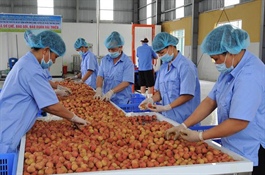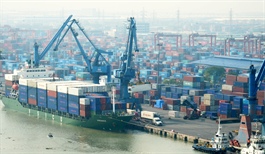Viet Nam should prioritise development of domestic market: experts
Viet Nam should prioritise development of domestic market: experts
In the context of instability in the world, Viet Nam needs to develop its domestic market with the "Vietnamese people giving priority to using Vietnamese products" campaign.

Truong Thi Ngoc Anh, vice chairwoman of the Viet Nam Fatherland Front Central Committee, said that at the workshop promoting growth and efficiency in implementing the "Vietnamese people give priority to using Vietnamese products" campaign, which was held on April 22 in Ha Noi.
At the workshop, Anh said in 2021, six groups of tasks and solutions were carried out according to the Central Communist Party's Directive 03 on promoting the implementation of the campaign, to enhance production and business, ensuring macro-economic stability and social security.
However, COVID-19 had not yet ended completely, meaning supply chains, trade activities, production and business activities still faced many difficulties.
Instability in the world economic and political situation had also affected the country's economic recovery after the pandemic.
As a result, the Vietnamese business community needed to actively participate in the campaign to develop the domestic market, Anh said.
“One of the basic solutions in developing the domestic market is to create a chain connecting supply and demand. This is also one of the important solutions to remove difficulties for production and business activities, and form supply chains from production to consumption for enterprises," Anh said.
"The chains will help recover the domestic economy and reach growth goals as forecast, contributing to the efficient implementation of the campaign in the new situation."
According to Vo Dai Luoc, former director of the World Economic Institute, the campaign has had a great effect on the Vietnamese business community, especially private businesses and households. However, there are few incentives for private enterprises and households, leading to many difficulties and challenges for them.
Luoc proposed that the Government provide supporting policies for Vietnamese private enterprises and households.
Tran Thi Phuong Lan, acting director of the Ha Noi Department of Industry and Trade, said that it was necessary to connect business associations with State management agencies so that the State could grasp the needs of the businesses, thereby removing difficulties for them.
Lan recommended the State should improve the mechanisms and policies for supporting the development of infrastructure, distribution systems, and investment in product development. It should also have support for agricultural production regions, and processing and logistics enterprises.
At the same time, it would be necessary to strengthen regional linkages, thereby planning regional development policies to avoid an imbalance of supply and demand.
The State also needed to enhance investment in the development of commercial infrastructure, to avoid imbalances between urban and rural areas.
In addition, it was necessary to focus on promoting the development of e-commerce to stimulate the consumption of young people, Lan said.
Mac Quoc Anh, vice chairman and general secretary of the Ha Noi Association of Small and Medium Enterprises, proposed that domestic businesses needed to be more careful in the preparation of production and distribution of goods, to ensure enough supply of products and services on the domestic market.
Along with that, they needed to reorganise goods selling points for people to promote market access in remote areas, he said.
























